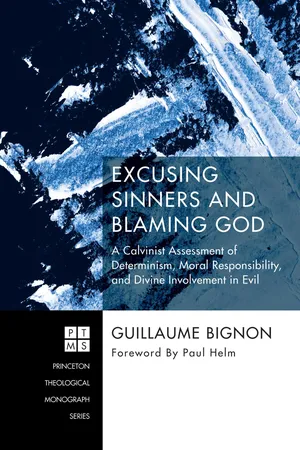
Excusing Sinners and Blaming God
A Calvinist Assessment of Determinism, Moral Responsibility, and Divine Involvement in Evil
- 254 pages
- English
- ePUB (mobile friendly)
- Available on iOS & Android
Excusing Sinners and Blaming God
A Calvinist Assessment of Determinism, Moral Responsibility, and Divine Involvement in Evil
About this book
Calvinist determinism destroys moral responsibility and makes God the author of sin. These two accusations are not new, and were arguably anticipated by Paul in Romans 9, but they remain today the most important objections offered against Calvinist/determinist views of human free will. This book is a philosophically rigorous and comprehensive defense of Calvinism against these two families of arguments. With respect to human moral responsibility, it discusses whether determinism destroys "free will," turns humans into pets or puppets, and involves or is analogous to coercion and manipulation. It responds to the consequence argument and direct argument for incompatibilism, the principle of alternate possibilities, the "ought implies can" maxim, and related claims. With respect to the authorship of sin, it discusses whether Calvinist determinism improperly involves God in evil. Does it mean that "God sins," or "causes sin," or "wills sin" in problematic ways? "Does God intend our sin, or (merely) permit sin?" In each case the coherence of the Calvinist view is defended against its most potent objections, to reject the claim that Calvinism is "excusing sinners and blaming God."
Frequently asked questions
- Essential is ideal for learners and professionals who enjoy exploring a wide range of subjects. Access the Essential Library with 800,000+ trusted titles and best-sellers across business, personal growth, and the humanities. Includes unlimited reading time and Standard Read Aloud voice.
- Complete: Perfect for advanced learners and researchers needing full, unrestricted access. Unlock 1.4M+ books across hundreds of subjects, including academic and specialized titles. The Complete Plan also includes advanced features like Premium Read Aloud and Research Assistant.
Please note we cannot support devices running on iOS 13 and Android 7 or earlier. Learn more about using the app.
Information
Calvinism and Moral Responsibility
Free will, pets, and puppets
Table of contents
- Title Page
- Foreword
- Acknowledgments
- Introduction, definitions, and methodology
- Part I: Calvinism and Moral Responsibility
- Chapter 1: Free will, pets, and puppets
- Chapter 2: The coercion argument
- Chapter 3: The manipulation argument
- Chapter 4: The mental illness argument
- Biblical interlude: “not the will of man”
- Chapter 5: The consequence argument and the principle of alternate possibilities
- Chapter 6: Beyond mere skepticism
- Chapter 7: A final few worries and conclusions on moral responsibility
- Part II: Calvinism and Divine Involvement in Evil
- Chapter 8: Preliminaries on the problem of evil
- Chapter 9: The “half-baked” argument and three recipes to complete its baking
- Chapter 10: The specific arguments from evil against determinism
- Conclusion
- Bibliography